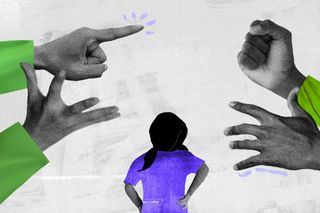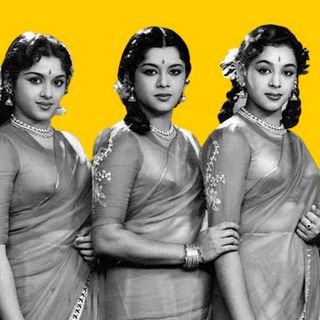
Many Young Adults Are Still Traumatized by Their Parents’ Fights. This Leads Them Into Destructive Relationship Patterns
“If the only language you know is that of argument and fighting and insecurity, you are going to speak that language in your next relationship.”

“I have parents who fight for everything… I think fighting is their love language.”
Machala Mann, 27, never understood if her parents ever really cared about each other. The messaging she got from them was confused. Cut to her own dating patterns as an adult: She would constantly fall “head over heels” for emotionally unavailable men who did little things that “get magnified” in her eyes.
The toll of witnessing parents fighting in what is supposed to be a safe space during one’s formative years can be scarring – and it manifests itself in far-reaching ways.
When S*, 29, was growing up, she played the adult to make peace between her constantly arguing parents. As an adult now, her standards for her own relationships have plummeted. “I did not have any positive model of relationships around me. I took a lot of toxicity from my ex because I thought that this is how hard it’s supposed to be,” she says.
The first mistake many parents make is assuming that their relationship with their children is independent of their relationship with each other. The second is telling their children that their incessant fighting is normal. Unbeknownst to many, children carry the wounds of their parents’ trauma not only in their childhoods but into their adult relationships too – creating a doomed cycle of replication. Worse, these wounds are normalized under the false assumption that everyone’s parents fight this way and that the unhealthy communication patterns and hurt they grow up witnessing is a fact of life.
Related on The Swaddle:
Teens Mirror Parents When They Fight with Dating Partners, Study Finds
Therapists note that the effect of parents fighting with each other on their children can be rather long-lasting. Ipsita Chatterjee, a Mumbai-based therapist, notes that when someone’s first exposure to a relationship is fraught with conflict and violence, it sets them up for bad relationships as adults.
For some people, even the sound of doors slamming continues to startle and haunt them till date – a telltale sign of a tumultuous home environment and one that precludes the possibility of sharing spaces with anyone else as adults. “Unconsciously, I started to tiptoe around the house… As an adult I live alone and I haven’t been able to commit. The smallest of disagreements in any relationship affects me a lot and I tend to overreact and destroy everything,” says A*, 20.
Constant parental conflicts gave Rishi, 24, a fear of commitment in a different way – his parents’ inability to make room for each other’s individuality led him to picking trivial fights with the people in his life as adults, unable to recognize their needs. “I harbor a pessimistic view on everyone and rarely appreciate people for who they are, because my parents rarely appreciated each other,” he says.
“Some people for the longest time deprive themselves of the love, companionship they deserve,” Chatterjee observes.
Gendered and restrictive mores surrounding marriages ensure that it is often women who end up receiving the short end of the stick: for some young women, it leads to a pattern of mirroring their mothers’ fate. J.A., whose parents had a rocky marriage with infidelity in it, learnt early on that women must stay no matter what. “[My mother] didn’t have a choice to leave the marriage, her parents also forbade her from leaving my father. Her mentality was that she had to make it work. Because of that, I stayed in a lot of toxic relationships because I used to believe that, as a woman, it’s up to you to stay in a relationship and fix it even if it doesn’t work, even if it’s affecting you in every possible way.”
For Priya, 23, her damaged relationships as an adult stem from not just witnessing her parents fighting but being made to get involved in them. Her father used to complain to her about her mother, warning her to not become like her. In a situation like this, Priya’s protectiveness of her mother melded into her personality itself: “Everything my mother says or does is used against her. So, I can never be vulnerable in front of anyone,” she says.
Staying together for the family, or for the childrens’ sake, is an oft-used refrain that parents resort to when their conflicts reach a breaking point. But as experts note – it does more harm than good. One of the primary reasons is that someone’s first and only safe space – the home – is jeopardized. “You don’t know what to make of it except that you’re not safe here. Your personal safety gets threatened in a time period when you’re supposed to feel safe and nurtured,” Chatterjee explains.
Even when children themselves ask their parents to get divorced, they are told that the fighting is normal – effectively setting them up for a lifetime of emotional damage from learning that deliberately hurting one another is “normal.” Further, when the first relationship one learns about is by itself unsafe, it paves the way for fear and anxiety around relationships themselves.
Related on The Swaddle:
Not Everyone Idolizes Their Parents. Why Do We Inevitably Mirror Them Still?
When people don’t avoid relationships, they replicate the patterns they’re familiar with – leading to a cycle of toxicity. “If the only language you know is that of argument and fighting and insecurity, you are going to speak that language in your next relationship because that’s what you’ve grown up with,” says Chatterjee.
“If you’re getting toxicity and you’re also getting love, it seems like it’s okay because love and violence have been normalized for me since childhood – I was told that they go together so let them go together,” Chatterjee adds.
The roots of such behaviour are often bigger than any individual person – our parents, too, are likely to be carrying the wounds of what they witnessed in their homes as children. A cocktail of imposed marriages, patriarchy, and gender norms lead to men in particular growing up to glorify their mothers’ suffering under their fathers’ hands, demanding that their own wives be as self-sacrificing and loving as their abused mothers. When these men marry women who grew up with a little more autonomy and self-assurance, the collision leads to the marriage going up in flames – burning their children along with it.
All this doesn’t just lead to damaged interpersonal relationships but has a bearing on society itself. “I think it is very safe and research-backed to say that the less traumatized children are, the healthier society gets,” Chatterjee says, explaining that unlearning unhealthy communication can set people up for better relationships platonically as well.
It is a powerful thing, then, to know that taking the step towards breaking generations of hurt can heal more than just individuals, but future generations as well.
“Recognizing that this is not my voice but a voice that has been intergenerationally conditioned is the first step… Society as a whole will be emotionally, physically, psychologically, socially, and also politically will be a lot more calmer and even just happier.”
*Names concealed to protect anonymity.
Rohitha Naraharisetty is a Senior Associate Editor at The Swaddle. She writes about the intersection of gender, caste, social movements, and pop culture. She can be found on Instagram at @rohitha_97 or on Twitter at @romimacaronii.
Related


Woe Is Me! “I’ve Realized My Closest Friends Are Actually Frenemies. What Now?”
